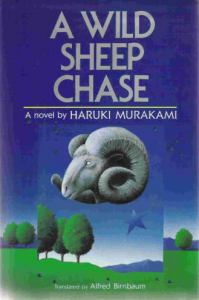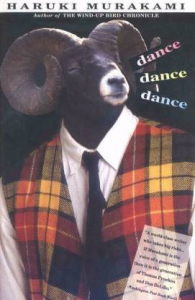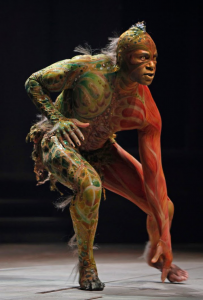The Sheep Man
Character: The Sheep Man
Source Text: Murakami, Haruki. A Wild Sheep Chase. Tokyo: Kodansha International, 1989. Print.
Entry Author: Mike Steigman
A WILD SHEEP CHASE
The Sheep Man is believed to be part sheep and part human, he appears out of the blue as an apparition to the main character searching for his friend in the mountains north of the Junitaki township. Interestingly, his mixed identity is quite literally all he has to his name. The “sheep” in “Sheep Man” comes before “man” insinuating he is more animal-like than human. Upon his entrance, Murakami states, “The Sheep Man wore a full sheepskin pulled over his head. The arms and legs were fake and patched on, but his stocky body fit the costume perfectly. The hood was also fake, but the two horned that curled from his crown were absolutely real (251).
He loses his temper with the main character after being questioned too much, but quickly regains his composure. The sheep man then apologizes to the main character because “sometimes it’s like the sheep in him and the human in him are at odds so he gets like that” (254).
He speaks human language, yet all of his sentences in the narrative are void of any spaces or capitalization, so it’s difficult to distinguish one word from another. One can say his words sound like animal noises in this sense. His basic qualities are reminiscent of a Neanderthal. He is attentive to polite behavior, yet flees at the first sign of violence, even metaphorical like when the protagonist raises his voice. The main character goes further to say, “The sheep man was just like an animal. Approach him and he’d retreat, move away and he’d come closer. As long as I wasn’t going anywhere, there was no hurry” (254). By being part-animal, the Sheep Man is unable to form any emotional ties with the protagonist, therefore further isolating both the main character as well as himself.
Murakami deliberately chooses to blend this man with a sheep in order to extract some of his humanity and highlight his weaknesses. The Sheep Man reveals the reason he hides out in the wilderness is because he didn’t want to go off to war, because members of the Junitaki Township went off to fight in the Russo-Japanese war. He claims he didn’t know who he would be fighting, he just knows he didn’t want to go. And “that’s why he’s a sheep.”
However, there’s a distinct binary evident in partially being a sheep. Sheep are herded by one person, with all their choices made for them by the shepherd. Once divided from the flock, a sheep is left with little direction. Animals are also typically perceived as strong, unstable, wild creatures. Centaurs and lycanthropes, part human and part animal, are mystical creatures, wise and fierce beyond human capabilities. Murakami plays with this notion while simultaneously categorizing, in his name, a mixed-race/species character, arguing that a double identity can weaken one’s abilities just as it can fortify them.
Lastly, The Sheep Man tells the protagonist, who had originally traveled to the Junitaki Township with his girlfriend had forced her to return to the Dolphin Hotel. He assures the protagonist that she didn’t want to be there and she doesn’t belong. The Sheep Man disappears as quickly as he entered in the novel, without explanation.
DANCE, DANCE, DANCE
The Sheep Man reappears in this novel, along with the main character. His mask has become grungy, his horns dilapidated, and he looks significantly older. This time, the Sheep Man appears where he had supposedly sent the main character’s girlfriend in A Wild Sheep Chase, the Dolphin Hotel. The main character presses a button in the elevator, and suddenly it opens its doors on a floor, pitch-black. The elevator refuses to move, so the main character exits to the floor and finds The Sheep Man sitting behind a desk. The Sheep Man speaks in the second person, constantly asking the narrator to tell “us” what’s going on outside as “we” want to know.
The Sheep Man’s costume appears more dingy than “last time”, his stature shorter and his breathing heavier. He advises the main character that he has to dance and keep on dancing, that is the only way to not lose direction.
Toward the end of the novel, the main character visits The Sheep Man together with Yumiyoshi, his girlfriend, but The Sheep Man has vanished. Reminiscent of A Wild Sheep Chase, The Sheep Man appears unable to exist alongside a partner of the protagonist. All that remains are clippings and yellowing pages about sheep that The Sheep Man had been guarding. They are now abandoned with no one to care for them. Having lived away from war and civilization, The Sheep Man grows older and older until he disappears into irrelevance, with any hope of peace from future wars disappearing along with him.



